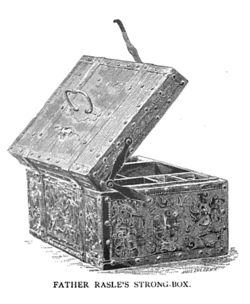Colonel Thomas Westbrook
| Thomas Westbrook | |
|---|---|

Westbrook retrieved Father Rale's strong box
|
|
| Born | 1675 Portsmouth, New Hampshire |
| Died | 11 February 1743/1744 (age 69) Falmouth, Maine |
| Occupation | Commander in the "East", Colonel of militia, King's mast agent, councilor, mill owner, speculator, innkeeper |
| Spouse(s) | Mary Sherburne |
| Children | Elizabeth (married Richard Waldron (Secretary)) |
| Parent(s) | John Westbrook and Martha Walford |
| Signature | |
Colonel Thomas Westbrook (1675–1743/44) was a senior New England militia officer in Maine during Father Rale's War. In addition to this senior militia role he was a scout, a colonial councillor, an innkeeper, a mill owner, a land speculator and a King's Mast Agent. He is the namesake of Westbrook, Maine.
During Queen Anne's War, Westbrook became a ranger in a small company of four (1704).
In 1716 the General Assembly of the Province made a grant to Thomas Westbrook, to keep the only public house at the Plains, in consideration that he should lay out six acres of land for the accommodation of drawing up the militia of the town. From at least 1720 he was the owner and proprietor.
During the years 1721-3 Westbrook became a captain in the militia and, after the fall of Colonel Shadrack Walton from favour with Massachusett's acting Governor William Dummer, became the colonel in charge of the militia in the "East" (Maine)
A focus during the Father Rale's War was the New England effort to apprehend Father Sebastien Rale, a Jesuit priest and French national who resided with and, the New Englanders thought, guided the natives to raid and kill or abduct New England colonists. The General Court of Massachusetts in December 1721 directed the militia to apprehend Rale and bring him to Boston to answer these charges.
In January 1722 Colonel Westbrook led a group of militia that, unable to find Rale, seized a strongbox containing his correspondence with Marquis de Vaudreuil, the French Governor in Quebec, and a hand written dictionary of the native Abenaki language. In the minds of New Englanders of the day, the letters proved French complicity in urging Native American tribes to attack New England settlements, and they were conveyed to authorities in Boston.
...
Wikipedia
